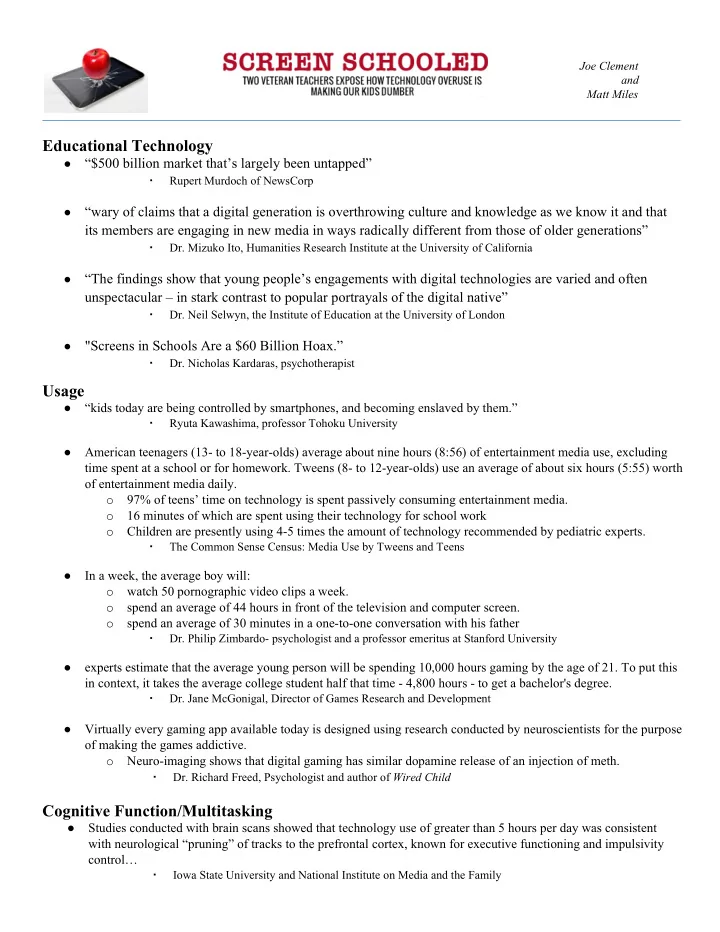

Joe Clement and Matt Miles Educational Technology “$500 billion market that’s largely been untapped” ● Rupert Murdoch of NewsCorp ▪ ● “wary of claims that a digital generation is overthrowing culture and knowledge as we know it and that its members are engaging in new media in ways radically different from those of older generations” Dr. Mizuko Ito, Humanities Research Institute at the University of California ▪ ● “The findings show that young people’s engagements with digital technologies are varied and often unspectacular – in stark contrast to popular portrayals of the digital native” Dr. Neil Selwyn, the Institute of Education at the University of London ▪ ● "Screens in Schools Are a $60 Billion Hoax.” ▪ Dr. Nicholas Kardaras, psychotherapist Usage ● “kids today are being controlled by smartphones, and becoming enslaved by them.” ▪ Ryuta Kawashima, professor Tohoku University ● American teenagers (13- to 18-year-olds) average about nine hours (8:56) of entertainment media use, excluding time spent at a school or for homework. Tweens (8- to 12-year-olds) use an average of about six hours (5:55) worth of entertainment media daily. 97% of teens’ time on technology is spent passively consuming entertainment media. o 16 minutes of which are spent using their technology for school work o Children are presently using 4-5 times the amount of technology recommended by pediatric experts. o ▪ The Common Sense Census: Media Use by Tweens and Teens ● In a week, the average boy will: watch 50 pornographic video clips a week. o spend an average of 44 hours in front of the television and computer screen. o spend an average of 30 minutes in a one-to-one conversation with his father o ▪ Dr. Philip Zimbardo- psychologist and a professor emeritus at Stanford University ● experts estimate that the average young person will be spending 10,000 hours gaming by the age of 21. To put this in context, it takes the average college student half that time - 4,800 hours - to get a bachelor's degree. Dr. Jane McGonigal, Director of Games Research and Development ▪ ● Virtually every gaming app available today is designed using research conducted by neuroscientists for the purpose of making the games addictive. Neuro-imaging shows that digital gaming has similar dopamine release of an injection of meth. o Dr. Richard Freed, Psychologist and author of Wired Child ▪ Cognitive Function/Multitasking ● Studies conducted with brain scans showed that technology use of greater than 5 hours per day was consistent with neurological “pruning” of tracks to the prefrontal cortex, known for executive functioning and impulsivity control… ▪ Iowa State University and National Institute on Media and the Family
● Half of teens say they "often" or "sometimes" watch TV (51%) use social media (50%), texting (60%) and listening to music (76%) while doing homework. The Common Sense Census: Media Use by Tweens and Teens ▪ ● “people who chronically multitask show an enormous range of deficits…They can't manage a working memory. They're chronically distracted. They initiate much larger parts of their brain that are irrelevant to the task at hand. And even - they're even terrible at multitasking.” 98% of people are incapable of doing two activities at the same time. o o The average student at Stanford uses 3-4 devices at a time. Dr. Clifford Nass, Sociologists Stanford University ▪ ● Participants who multitasked on a laptop during a lecture scored lower on a test compared to those who did not multitask, and participants who were in direct view of a multitasking peer scored lower on a test compared to those who were not. The results demonstrate that multitasking on a laptop poses a significant distraction to both users and fellow students and can be detrimental to comprehension of lecture content. Dr. Fara, et al, “ Laptop multitasking hinders classroom learning for both users and nearby peers” ▪ Mental Health ● Study shows heavy digital users are more likely to get into trouble a lot, be sad or unhappy, and more frequently bored. ● 10-11-year-olds who used electronics for 2+ hours suffered more psychological distress than kids who uses less. ● “The overuse of technology isn't the only problem, it's the experiences that are fundamental to healthy development that are being replaced by the overuse of technology.” ▪ Dr. Richard Freed, Psychologist and author of Wired Child ● Excessive technology use has been associated with: historically low rates of human empathy o o decline in the number of real-life relationships increased depression o o increased anxiety increased suicidal thoughts o o increased attention deficit autism/autism like behavior o o increased aggression and hostility increased rates of childhood bipolar disorder o o dysfunctional coping skills worse academic achievement o o problems with verbal memory low well-being and high loneliness o o problems sleeping psychosis o o seizures the National Institutes of Health, (Bristol University 2010, Mentzoni 2011, Shin 2011, Liberatore 2011, ▪ Robinson 2008) Technology in Schools • Banning cell phones in school: o is the equivalent of adding a week to the school year. had a 6.4% improvement on test scores. Underachieving students increased by 14% o • London School of Economics • the more schools invest in technology, the less likely children are to pay attention and learn o Dubbed the “Learning Paradox” • (Rowan C, 2010). • “the introduction of home computer technology is associated with modest, but statistically significant and persistent negative impacts on student math and reading test scores. Further evidence suggests that providing
universal access to home computers and high-speed Internet access would broaden, rather than narrow, math and reading achievement gaps.” • (Vigdor, 2014) • the claim that 1:1 technology initiatives improve student achievement…is specious.” (Sell et al. , 2012) • Please join us on “Beyond the Screens” on Google Communities, PaleoEducation.com, and look for our book, Screen Schooled , available now in bookstores and Amazon.
Recommend
More recommend